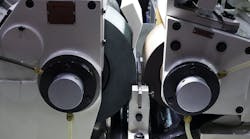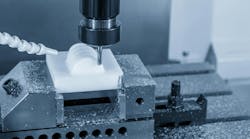Today’s metalworking environment has changed dramatically over the past two decades but many apprenticeship programs haven’t matched those changes. One trade organization that is transforming the way metalworking apprentices are trained is TMA. TMA is a Park Ridge, Ill.-based, full service manufacturing association for companies with various services and programs.
One of TMA’s largest and most in-demand training programs is its Related Theory Apprentice Training Program that benefits the students as well as the many metal working companies that need skilled employees now more than ever. Determining the best to train these young people in the trade has been the cause of some dispute over the years, however TMA is finding and implementing new methods and avenues of training metalworkers in the 21st century.
At one time, TMA’s apprenticeship program had close to 400 students every year. However, the economic downturn in 2008 resulted in the program’s temporary suspension due to a lack of students. In 2011, the program was revived and revised. Two separate sessions of first-year related-theory apprentice training are currently running.
In fact, TMA is so dedicated to its Apprentice Training program that it recently hired Patrick Osborne as its director of education to oversee the program’s advancement. “With the downturn in the economy, the training budget was the first thing to go in many companies,” according to Osborne. “Two years ago, nobody was training. Companies were laying people off.”
Today, TMA finds a renewed interest in the program as metal fabricating, tool-and-die, moldmaking, and machining facilities are experiencing resurgent demand from a recovering manufacturing sector. “The crown jewel of TMA has always been the Apprentice Training program,” said Osborne, “and we’re pleased that the program is coming back strong. The TMA Apprentice Training Program has changed in many ways. Our curriculum is changing and we’re constantly looking to make it stronger, as well as looking at different ways to teach students.”
Jonathan Martinez is one of the program’s success stories. He attended from 1998 through 2001, and today he’s the operations manager for X-L Engineering Corp. in Niles, IL, a modern machining facility serving medical, aerospace, business equipment and new technologies manufacturers. In addition, Martinez is also a teacher in TMA’s revitalized Apprentice Training Program.
“I’m glad we’re starting these classes again and that interest in apprentice training has picked up,” said Martinez. “Many of the Chicago public schools have cut back their vocational programs in recent decades, and this reduced number of workers skilled in machining practices causes real difficulty now as I look for replacements for people who have left, or are retiring from the industry.”
Rich Nielsen, director of engineering for IMS Burke-Olson LLC, in Arlington Heights, IL, has a long history with TMA. He taught in the Apprentice Training program for 10 years a number of years ago, and has served on the Training Committee and on the Board of Directors as well. “Traditionally, the TMA model is that the employer provides the hands-on training and TMA offers the related-theory training,” Nielsen explained. “At IMS Burke-Olson we’ve been training apprentices using TMA Apprentice Training for a long time.”
IMS Burke-Olson has been a TMA member since 1955.
Like Martinez, Nielsen is grateful for the return of the TMA Apprentice Training program. “The downturn really hit us between the eyes, and we called it off for a couple of years,” he recalled. “However, during this time we explored other options for delivering the material and drove our research into the online training movement, and that led us down a path toward some possibilities in the future. Starting this year, as we polled members, we’re expecting the training levels to increase.”
Nielsen concurs that finding skilled employees is a challenge that is made more difficult by the lack of people being trained over the past few years. “There’s a larger gap than ever in the pool of workers out there,” Nielsen noted. “There are still a lot of older people, but we need younger people to enter the trade now so they can take advantage of the knowledge-base of these older workers in our companies.”
Helping employers hire and develop employees with confidence — Getting started in TMA’s Apprentice Training Program requires potential students to begin with a WorkKeys job skills assessment program, developed by ACT. WorkKeys also can help employers to select, hire, train, develop, and retain a high-performance workforce. WorkKeys assesses employee competence in several areas to assess the participant’s readiness for training. WorkKeys focus on three areas: Applied Mathematics, Locating Information, and Reading for Information.
These three WorkKeys tests demonstrate a candidate’s preparedness in the foundational skills and abilities necessary for success in the working environment. ACT maintains an extensive database of job profiles, making it easy to measure a candidate’s skill set against position requirements. It’s also easy to generate custom job profiles that reflect the unique demands of a specific manufacturing company.
After completing these three assessments, participants are eligible for a National Career Readiness Certification (NCRC).
“Targeted training makes the most of your training dollars,” Osborne stated. “It allows employers to pinpoint specific areas for employee development, producing better results with lower overall costs.”
Developing training programs that fit today’s metalworking requirements is critical to the success of the new employees — and of the company, too. Retiring baby boomers will soon (if not already) create a shortage of 80 million experienced workers, and a lack of that “tribal” knowledge that comes with all that experience. “With younger – and often less qualified – people stepping in to take their place, succession planning in the area of hiring and skills development is more critical than ever,” Osborne pointed out.
Another change in TMA’s training approach over the past decade includes TMA’s Roadmaps for “Top 6” TMA Careers that use a blend of online and instructor-led training. Students can hone specific skills for specific careers within the metalworking trades. Starting with the New Hire/Basic Skills Training Roadmap, these basic courses are designed to assess a new employee’s skills, determine trainability and introduce basic manufacturing concepts and competencies. Courses consist of Safety Practices and Regulations, Mathematics 1, Inspection Techniques 1 (measurement), and Blueprint Reading.
There is a Roadmap for CNC Operator Training, CNC Programmer Training, Die Maker Training, and Mold Maker Training, with each program designed to raise the level of instruction and hands-on training depending on the job requirements. Additionally, there is a Roadmap for Maintenance Technician Training.
Additional new certificates and training development — TMA also offers MSSC Certification Courses that include instruction for entry-level personnel, apprentices, inspectors, and production personnel in Safety Awareness, Manufacturing Processes & Production, and Maintenance Awareness. A more extensive course for production personnel, apprentices, inspectors, quality engineers, tool-and-die makers, CNC machinists, mold makers and front-line supervisors is the MSSC Quality Practices & Measurement certification course.
“We’re also in the process of getting NIMS accreditation,” Osborne reported. The National Institute for Metalworking Skills (NIMS) is the nation’s only ANSI accredited developer of precision manufacturing skill standards and competency assessments. Additionally, NIMS certifies individual skills against standards and accredits programs that meet its quality requirements. NIMS offers a one-year, Comprehensive Implementation Program (just announced on January 11) that focuses on long-term performance expectations of metalworking training programs, while maximizing the ability of a training program to test against NIMS standards by establishing fixed regulatory and testing costs.
Osborne explained that with NIMS accreditation, TMA can offer training to apprentices so that their credentials will be portable. “With just a TMA certificate, someone in another part of the country might not be familiar with that program,” he said. “The NIMS credentials offer portability of the training.”
Incorporating online training into TMA’s course offerings allows employees to further their careers with online courses offered through TMA. TMA partners with companies like ToolingU and Amatrol to make these online courses available to TMA members. Although not part of their traditional Apprentice Training Program, TMA offers these online courses for career development.
TMA also works closely with community colleges that provide instructor-led training in classes such as MasterCam and CNC Programming Set-up & Operation. “Another way that TMA offers career development is by offering NIMS certification through TMA and hands-on training at a local community college that has the equipment,” said Osborne.
Recently, TMA’s Education Foundation gave a $15,000 grant to the College of DuPage for its Manufacturing Technology program. Funding will support a portion of the purchase cost for five, state-of-the-art Bridgeport vertical milling machines that will be used in basic and advanced machine-shop classes. TMA recognizes that today’s apprentices need to be trained on state-of-the-art equipment to prepare them for the real-world shop environment where high-speed and CNC equipment is the rule rather than the exception in most companies.
“My background is high-speed machining centers, the newer equipment,” said Martinez. “With high-speed, 5-6 axis machining centers, we’re putting the focus on the newer equipment with a higher level of complexity. In addition, we are covering new grades of carbide with specialized coatings to increase tool life, which allows for faster speed and feeds. However, we’re taking some things from the old apprentice program and implementing new ideas – it’s a work in progress.”
Nielsen added that the advantage of TMA’s Apprentice Training program is that the instructors have experience in the trades. “The instructors are people in the field and teach in the evening what they do during the day,” he indicated. “That’s always been a great strength of TMA’s program versus community colleges where the instructor may not have the experience in what they’re teaching.”
While TMA has a strong bench of quality instructors who have the hands-on experience in what they were teaching, these instructors have also had in-service training with educational professionals who taught them how to teach. “We train tool and die makers and the educators train us in teaching,” Nielsen added.
The TMA Apprentice Training program is a three-year program that includes varying levels of courses that begin with Industrial Math, Industrial Print reading, and Machine Tool Technology. Second-year students focus entirely on Machine Tool Technology with an emphasis on math and CNC machining. In the third year, students may choose to focus on Basic Die Making, Basic Mold Making or CNC Programming, according to their interest.
Classroom instruction takes place at TMA’s offices in Park Ridge, Ill. Classes meet twice per week in the evening, for two semesters. Each semester lasts 14 weeks and provides 42 hours of instruction.
Currently, TMA is developing other courses and using new books to reflect better the advancements in machine tool technology. And, while three years may seem like a long time, X-L’s Martinez noted that shorter programs, such as six-month series offered by some other trade schools, aren’t nearly enough to give students what they need.
Additionally, the on-the-job-training that goes along with the formal Apprentice Training classes is critical. “There’s a lot of tribal knowledge in a shop,” observed Martinez, “and that’s why a program like this is so important. I’m excited to get back into teaching in the program.”
Attracting young people to look forward to careers in metalworking is a goal for TMA. To that end, it offers a one-week summer camp program for high school students, during which they can take the WorkKeys exam and earn a NCRC certificate. “They spend a half-day at TMA and a half-day field trip at a member company’s facility,” said Osborne. “We also have an annual machining competition where we send blueprints to high school instructors who work with their students to machine the parts to tight tolerances. We feel that this engages the younger students and get them interested in the metalworking trades.”
As TMA’s Apprentice Training Program comes into the 21st century and becomes more relevant to today’s metalworking company circumstances, the organization will continue to look for new ways to keep its training current. “We want to fill the pipeline with young people interested in careers in metalworking and be a recruiting ground for the next generation of skilled workers,” Osborne concluded.
For more information on how you can join TMA and participate in TMA training including the Apprentice Training program, contact Patrick Osborne, at [email protected]







